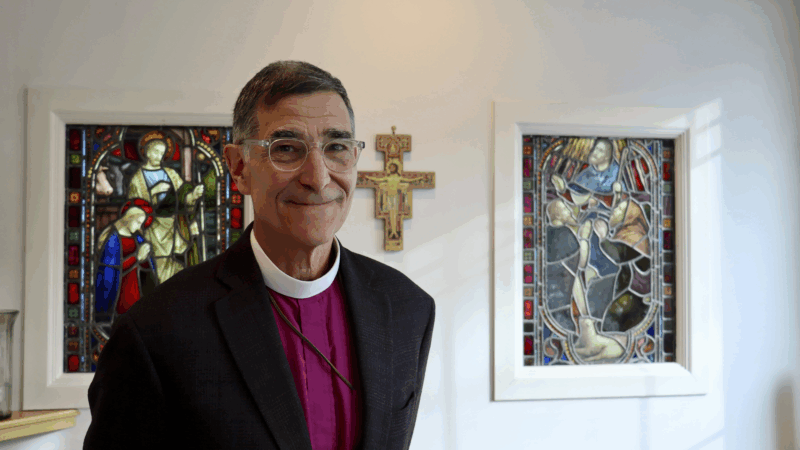Greetings from Palmyra, Syria, with its once-grand hotel named for a warrior queen

Far-Flung Postcards is a weekly series in which NPR’s international correspondents share snapshots of moments from their lives and work around the world.
Battered and bullet-ridden but still standing! It doesn’t look it now, but this was one of the most elegant hotels in the Middle East. The Zenobia was built in the 1920s. It was named after Queen Zenobia, the legendary ruler of ancient Palmyra who annexed part of the Roman Empire when the city was a key stop on the Silk Road.
I took this photo in late January, when I went back to Palmyra for the first time in three decades for a look at how the iconic site and city had fared over the years of war when it was inaccessible to tourists.
I’d stayed at the Zenobia in the ’90s and it was glorious — quirky and full of life and possibly even ghosts. A three-hour-drive from Damascus — longer in a dodgy taxi — the ancient Roman city rose up in the distance like a desert mirage. The hotel itself had certainly seen better days, but oh, the wonder of having even a bad Syrian glass of wine in a dining room literally steps away from the ruins. An equally short walk away were the caverns with underground springs for adventurous bathers.
I didn’t see ghosts but if there were, perhaps Agatha Christie, who stayed there with her archaeologist husband a century ago, might have made an appearance. Or djinns — the supernatural beings said to favor living in the desert.
They would have plenty of solitude. Syria is recovering from 12 years of civil war and Palmyra itself changed hands twice during fighting between the Syrian regime, Russian forces and ISIS.
You see the part of the sign with missing letters? It used to read “Cham Palace,” the Syrian hotel chain that ran it. No news on the hotel’s future, but people here are looking forward to welcoming tourists again.
See more photos from around the world:
- Greetings from Mexico City, where these dogs ride a bus to and from school
- Greetings from the Galápagos Islands, where the blue-footed booby shows its colors
- Greetings from Afrin, Syria, where Kurds danced their hearts out to celebrate spring
- Greetings from Dharamshala, India, where these Tibetan kids were having the best time
- Far from the front lines, Ukrainians fight a war to preserve their culture
- As Greenland prepares for tourism increase, a moment of stillness
Venezuela: Maduro’s enforcer Cabello still central to power
The ousting of Venezuela's president raised hopes of change — but the politician now controlling the streets shows how little has really shifted.
Amid ICE clashes, New Hampshire bishop urges clergy to prepare their wills
The Episcopal bishop of New Hampshire told priests protesting ICE to get their wills and affairs in order. Some praise the bishop, while other priests say they never signed up to be martyrs.
New York Giants hire John Harbaugh as coach after identifying him as their top choice
Harbaugh joins the Giants 11 days after he was fired by the Baltimore Ravens. The Super Bowl champion is now tasked with turning around a beleaguered franchise.
US launches new retaliatory strike in Syria, killing leader tied to deadly Islamic State ambush
A third round of retaliatory strikes by the U.S. in Syria has resulted in the death of an Al-Qaeda-affiliated leader, said U.S. Central Command.
NASA rolls out Artemis II craft ahead of crewed lunar orbit
Mission Artemis plans to send Americans to the moon for the first time since the Nixon administration.
Trump says 8 EU countries to be charged 10% tariff for opposing US control of Greenland
In a post on social media, Trump said a 10% tariff will take effect on Feb. 1, and will climb to 25% on June 1 if a deal is not in place for the United States to purchase Greenland.






